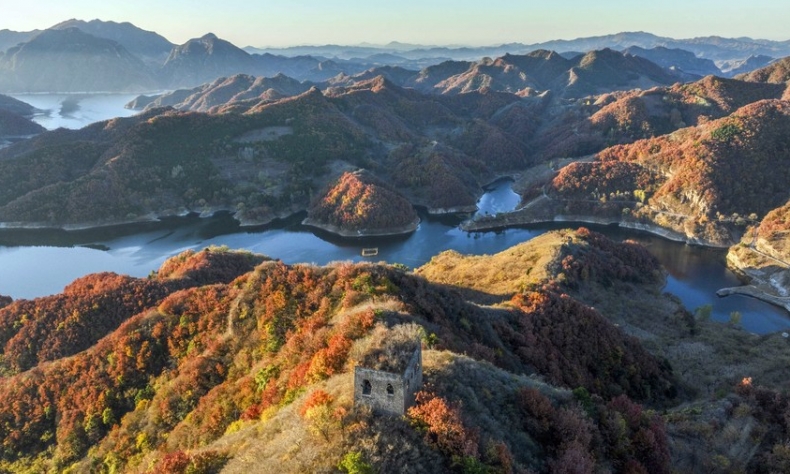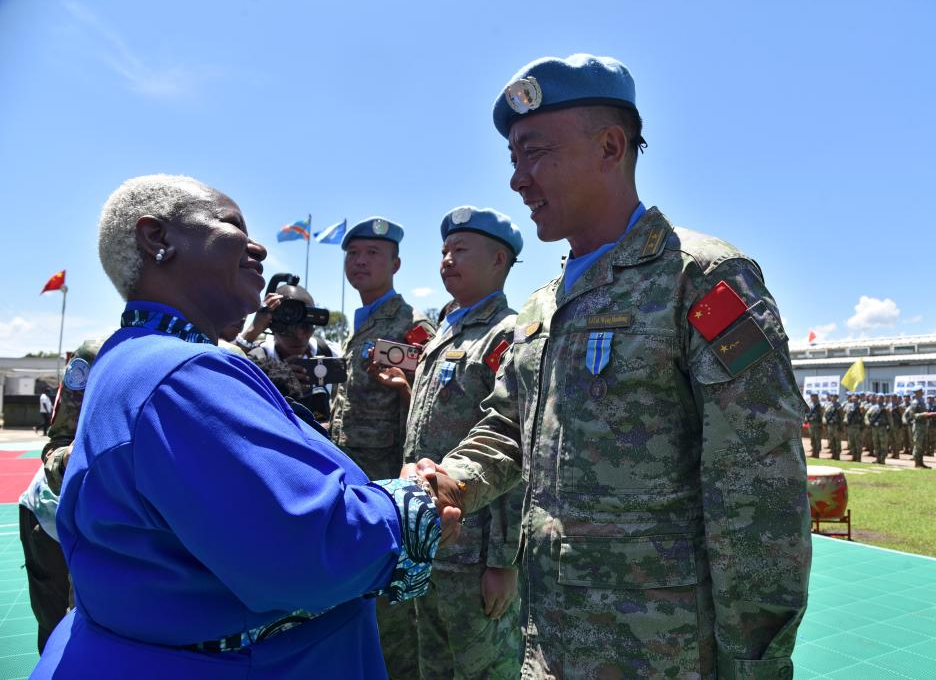China’s Vision Offers Hope Amid Global Security Crisis

Beijing’s efforts to pursue peace through dialogue, support for the U.N.-centered governance system and promotion of mutual coexistence, multilateralism and non-interference embody its apolitical vision to safeguard security and foster the peaceful development of all nations.
This year marks the 80th anniversary of the victory of the Chinese People’s War of Resistance Against Japanese Aggression and the World Anti-Fascist War. After an unflagging 14-year resistance and suffering over 35 million military and civilian casualties, the Chinese people achieved a great victory in the war.
This war was described as the “Asian” and “forgotten” holocaust. The invading Japanese military forces committed heart-wrenching atrocities and brutal war crimes against Chinese men, women and children. The Chinese people also became victims of biological warfare and ghoulish experiments. In the meantime, with huge sacrifices, the Chinese nation struggled unremittingly to establish the values of international peace, security and justice, as stipulated in Article 2 of the United Nations Charter.
Today, the world is facing the highest number of conflicts since World War II, costing $17.5 trillion a year. About 2 billion people, or a quarter of the global population, including one in every five children, live in conflict-affected regions. The international security landscape has deteriorated sharply.
Worldwide, six out of seven are plagued by feelings of insecurity. More than 12 million children have been killed, injured or displaced by conflicts across the Middle East and North Africa in just two years. State-based armed conflict climbed from last year’s No. 8 to No. 1 risk in the World Economic Forum’s Global Risks Report 2025. The U.S. preference to resolve conflicts unilaterally further pushes the world toward instability.
Worsening conflicts, rising geopolitical tensions and eroding trust in multilateral institutions are reshaping the global security environment. Climate change and transnational organized crime compound these dense challenges. The profound shifts have led to demands for new visions and mechanisms for international cooperation and restructuring multilateral organizations.
The Global Security Initiative (GSI), proposed by Chinese President Xi Jinping, offers a flexible and innovative vision. It promotes common, comprehensive, cooperative and sustainable security. It respects the sovereignty of all countries and seeks to resolve disputes through dialogue while committing to maintaining security in both traditional and non-traditional domains.
The GSI immediately precipitated a ruckus in Washington. Officials there viewed it as an attempt to “challenge, tear down and even destroy” the U.S.-led international order. However, the initiative actually aims to eliminate the root causes of international conflicts and reduce the risk of their recurrence. It promotes multilateralism as a way to address widening deficits in peace, development, security and governance. The GSI seeks to strengthen the international system, underpinned by international law, with the United Nations at its core.

The initiative supports U.N. efforts to reinforce conflict prevention, resolve conflicts through development and establish security through political dialogue, peaceful negotiation and diplomatic means. The GSI encourages international cooperation on climate change and transnational crime. It stresses the implementation of the U.N. 2030 Agenda for Sustainable Development to promote sustainable security. It also supports structural and transnational components of conflict prevention but is cautious about operational segments or “direct prevention” because of their tendency toward military intervention, which is at variance with China’s principle of non-interference.
China has been instrumental in strengthening global security and advancing world peace under U.N. auspices. As a permanent member of the U.N. Security Council and a responsible international player, Beijing has actively participated in U.N. peacekeeping operations since 1990 to build and maintain peace in conflict-ridden countries.
Beijing is the largest troop contributor to U.N. peacekeeping operations among the Security Council’s permanent members and the second-largest of assessed contributions to U.N. peacekeeping operations. In collaboration with the U.N., China has also established the Peace and Development Trust Fund, whose Peace and Security Sub-Fund supports peace activities, including mediation, preventive diplomacy, peacekeeping, counterterrorism and cybersecurity.
Over the past 35 years, the Chinese military has participated in 25 U.N.-mandated peacekeeping missions and deployed about 50,000 personnel to more than 20 countries and regions, including the Democratic Republic of Congo, Lebanon, Sudan and South Sudan. Chinese peacekeepers have conducted mine clearance and explosive ordnance disposal operations, provided medical treatment and protected civilians.
Chinese women have stood beside Chinese men to strengthen international security and promote peace. Some 332 of China’s Blue Helmets, including 16 women, received a prestigious U.N. medal in 2023 for their contributions in upholding durable peace, improving community lives and building top-quality infrastructure in South Sudan.
Africa faces a complex web of security threats, ranging from terrorism and insurgency to political instability and transnational crime. Security is a prerequisite for regional development, and China is committed to bolstering the continent’s security, as illustrated by the Partnership Action for Common Security.
Proposed by Xi at the Forum on China-Africa Cooperation last year, this initiative pledged 1 billion yuan ($139 million) in military assistance to Africa. It will also provide training to 6,000 military and 1,000 law enforcement personnel. Rather than an effort to counterbalance or overtake U.S. traditional leadership in the security realm, it aims to boost practical cooperation in traditional and non-traditional security to jointly promote peace and ensure meaningful development.

China’s peace efforts extend to support for a nuclear-free world. Xi once called nuclear weapons “the Sword of Damocles” hanging over humanity. Unlike Washington, which maintains deliberate, calculated ambiguity on nuclear weapons, Beijing pursues a self-defensive nuclear strategy and has committed to a no-first-use policy. China’s Peace Ark hospital ship has traveled across six continents and three oceans to treat people in dozens of countries, delivering a message of interconnectedness and common humanity.
Playing a proactive mediation role, China brokered a normalization deal between Saudi Arabia and Iran in March 2023. More than two years after the historic rapprochement, diplomatic engagement between the two neighboring nations continues, despite concerns of fragility. Riyadh openly denounced U.S. attacks on Iran’s nuclear facilities and violations of Tehran’s sovereignty during the recent Israel-Iran conflict.
China has reiterated its support for the two-state solution to end the longstanding Palestinian-Israeli conflict. To prevent the crisis from worsening, Beijing has urged Israel to halt its Gaza siege immediately. China has also reaffirmed support for Arab efforts to end the war and ensure the free flow of humanitarian assistance to Palestinians.
On the Ukraine crisis, Beijing advocates a negotiated peace solution. In February 2023, China released its peace plan containing key proposals such as respecting territorial integrity, abandoning the Cold War mindset, resuming peace talks, resolving the humanitarian crisis and lifting unilateral sanctions. If implemented fully, it could lead to sustainable peace between the warring parties in Europe.
Beijing’s efforts to pursue peace through dialogue, support for the U.N.-centered governance system and promotion of mutual coexistence, multilateralism and non-interference — essential elements woefully lacking in the contemporary international order — embody its apolitical vision to safeguard security and foster the peaceful development of all nations.
Amid an increasingly unstable and fragmented global security landscape marked by unilateralism, protectionism, hegemonism and power politics, this peaceful, multilateral and pluralistic approach holds potential for narrowing the international security deficit. It could advance world peace and combine resources to counter real threats to humanity, such as climate change, terrorism and transnational crime.
Azhar Azam is a geopolitical analyst with a keen interest in the economy, climate change and regional conflicts.
 Facebook
Facebook
 Twitter
Twitter
 Linkedin
Linkedin
 Google +
Google +










